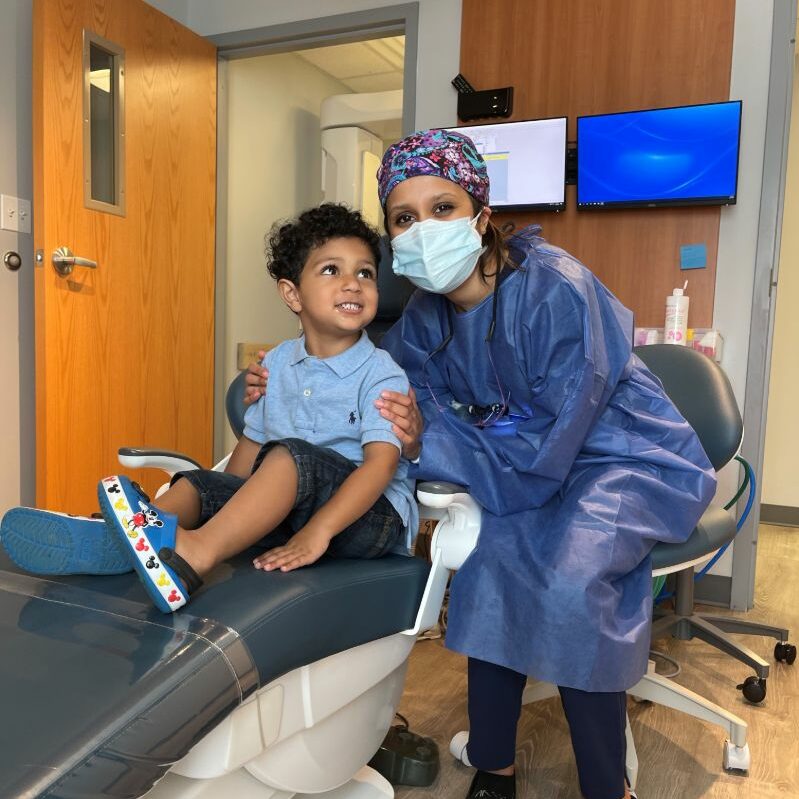Pediatric Dentist: Specialized Care for Your Child's Dental Wellness
Pediatric Dentist: Specialized Care for Your Child's Dental Wellness
Blog Article
Navigating Common Pediatric Dental Issues: An In-Depth Take A Look At Preventive Dental Take Care Of Children
Dealing with pediatric dental concerns is necessary for fostering lasting dental health in kids. The relevance of preventative treatment can not be overstated, as it lays the foundation for efficient dental hygiene practices and dietary selections that reduce usual problems such as tooth cavities and periodontal illness. Understanding when to start dental sees and what methods to take on can encourage parents to take proactive actions. Nonetheless, numerous moms and dads continue to be not aware of the particular steps that can be taken to safeguard their kids's oral health. Discovering these methods discloses critical insights that may dramatically affect their kid's future well-being.
Typical Pediatric Dental Issues
Kid's dental health is crucial for their general wellness, yet numerous problems can arise throughout their developmental years. Among one of the most widespread worries are cavities, commonly referred to as cavities, which can occur due to inadequate dental hygiene and too much sugar consumption. If left untreated., this condition can lead to discomfort, infection, and succeeding issues.
Another typical issue is malocclusion, where teeth are misaligned. This can result from hereditary factors, early loss of baby teeth, or thumb-sucking practices. Malocclusion might not only influence a youngster's look however can additionally hinder chewing and talking, necessitating orthodontic treatment.
Gum condition, although frequently neglected, is an additional significant worry for kids (kid dentist near me). Gingivitis, the beginning of gum condition, can occur from plaque accumulation and may lead to more serious conditions if ignored
Additionally, oral trauma prevails amongst active kids, commonly resulting from falls or sporting activities injuries. Such events can cause fractures or dislodgement of teeth, needing instant like prevent long-lasting damages.
Recognizing these usual pediatric oral issues is vital for ensuring timely treatment and maintaining optimal dental wellness for kids.
Significance of Preventive Treatment
Preventative care plays an essential duty in maintaining children's dental wellness and reducing the risks related to typical issues like cavities, malocclusion, and gum condition. By prioritizing preventative steps, parents can considerably decrease the probability of their youngsters experiencing these oral troubles, which can result in discomfort, expensive therapies, and lasting wellness problems.
Routine oral examinations are necessary for early detection of prospective issues. Throughout these visits, oral professionals can keep track of the development of teeth and jaws, give tailored guidance, and apply essential preventive therapies such as sealants and fluoride varnishes. These interventions aid secure versus decay and promote optimum oral wellness.
Additionally, a strong foundation in preventive care fosters favorable perspectives in the direction of dental health and wellness in kids. By instilling healthy practices early, such as regular cleaning and the significance of a well balanced diet, parents can urge long-lasting practices that add to general health.
Effective Oral Hygiene Practices
Establishing effective oral hygiene techniques is important for making sure that children preserve healthy and balanced teeth and gums throughout their developing years. Parents ought to begin by presenting dental care as early as the eruption of the very first tooth. Making use of a soft-bristled tooth brush with a small head, moms and dads must delicately clean their kid's teeth two times a day with a fluoride toothpaste appropriate for their age.

Routine oral check-ups, ideally every 6 months, help keep an eye on oral health and develop a regimen of preventative treatment. In addition, mentor youngsters the importance of brushing for a minimum of two mins, concentrating on all surfaces of the teeth, and using a timer or track can make the procedure delightful.
Urging youngsters to take obligation for their oral hygiene cultivates lifelong behaviors. By instilling these practices early, moms and dads can significantly lower the threat of cavities and gum tissue condition, paving the way for a lifetime of oral health and wellness.
Dietary Factors To Consider for Dental Wellness
While routine oral hygiene is important for maintaining oral health, dietary selections also substantially influence the condition of children's teeth and periodontals. A balanced diet rich in necessary nutrients can enhance enamel and support general dental health. Foods high in calcium, such as milk items, leafy greens, and fortified plant-based alternatives, play an important duty in creating strong teeth and bones. Additionally, phosphorus located in nuts, meats, and vegetables help in the remineralization of tooth enamel.
On the other hand, extreme consumption of sweet treats and drinks can bring about dental cavity and cavities. Bacteria in the mouth eat sugar, generating acids that attack tooth enamel (kid dentist near me). Parents should urge healthier treat content choices, such as fruits, veggies, and whole grains, while limiting sugary treats
Encouraging youngsters to consume alcohol water, especially fluoridated water, can better promote oral health by rinsing away food fragments and neutralizing acids. In recap, a well-shaped diet is an essential element of preventative oral care for children.
When to See the Dental Practitioner
Routine dental gos to are necessary for keeping optimum dental health in youngsters. The American Academy of Pediatric Dentistry recommends that kids have their very first oral consultation by the age of one or within six months after their first tooth erupts. Early visits permit the facility of a dental home, promoting a relying on connection in between the child and the dentist while helping with precautionary care.
Routine exams need to take place every six months to keep track of the advancement of the youngster's teeth, analyze oral health practices, and use precautionary therapies such as fluoride varnishes and oral sealers. Additionally, moms and dads must schedule instant visits if they discover any type of signs of dental concerns, such as tooth pain, sensitivity, swelling, or discoloration, as these may indicate dental caries or various other concerns requiring punctual interest.
Kids with special health and wellness treatment requirements or a history of dental troubles may require even more frequent visits. By sticking to these guidelines, parents can aid ensure that their youngsters maintain a healthy smile and create good dental practices that last a life time. Overall, normal oral check outs are critical for very early discovery and intervention, which can significantly affect long-lasting oral wellness results.
Final Thought
Regular oral brows through play a crucial function in the prompt recognition of possible problems, ensuring that kids create healthy and balanced practices from a young age. By focusing on these actions, individual dental plans parents can contribute to their youngsters's general well-being and oral success.

Report this page